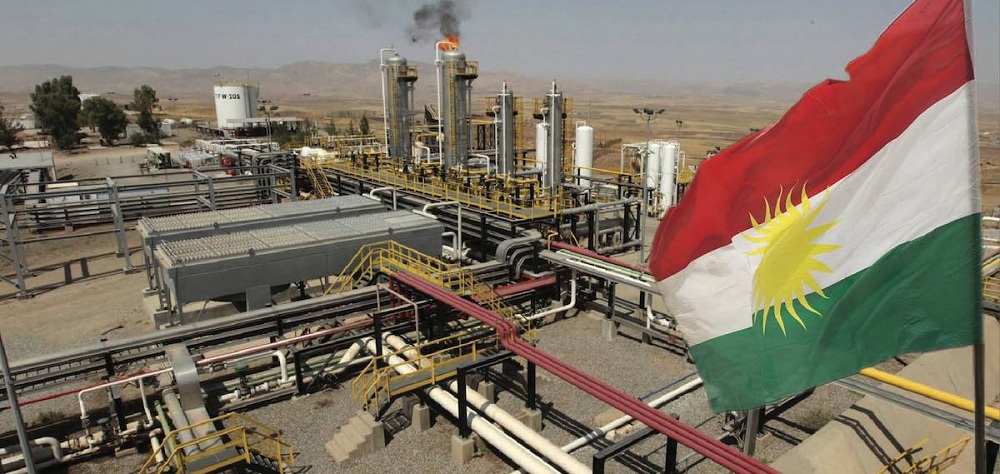Alwaght- After years of unchecked freedom of the Iraqi Kurdistan region's government in oil sales in the shadow of lack of central government's supervision and questioning, a heavy economic storm seems to be moving to the autonomous region and Erbil should prepare for end of unchallenged sales of the region's resources.
Rocket attacks on Khor Mor gas field in Sulaymaniyah last week reignited the Baghdad-Erbil dispute on gas and oilfields in the Kurdish region, with some oil companies stopping their activities as the oil and gas rift gains momentum. Schlumberger international oil technology company is the second international oil company after Baker Hughes that has announced withdrawal from the oil and gas fields of Kurdistan region of Iraq this week. Additionally, Iraqi media report that the "Dana Gas" company, the most important Emirati company investing in the gas sector of Iraqi Kurdistan, suspended its operations in Khor Mor gas field.
Khor Mor is one of the biggest gas projects in Iraqi Kurdistan and produces 452 million cubic foot of gas per day. Dana Gas, Crescent Petroleum, and Chemimal, which represents Peart Petroleum, operate in the gas field.
Iraqi media outlets predict that the American Haliburton Company would submit to the Iraqi Supreme Court ruling and quit investment in the autonomous region's energy projects.
The suspension of the operations of these companies should be seen as the consequence of the Iraqi Supreme Court's ruling on the independent sale of hydrocarbon resources by the Kurdistan Regional Government (KRG) issued in February, which continues to date. According to the order of the country's highest judicial authority, the law that allowed Erbil to manage and trade its oil and gas productions is "invalid" and Erbil must hand over all of its hydrocarbon production operations to the country's federal government.
The ruling at the time led to verbal tensions between Baghdad and Erbil as the Federal Court's decision challenged the validity of contracts Erbil authorities had signed with international oil companies.
In May, federal ministry of oil proposed the foundation of a new oil company in the Kurdistan region. More precisely, Baghdad asked Erbil to allow State Organization for Marketing Oil (SOMO) open an office in the region and place its oil exports under the supervision of the central government.
The ministry of oil announced on May 12 that an analysis of oil and gas exploration contracts shows that the financial terms in deals signed by the federal government are better than those signed by the KRG.
Erbil exported 454,000 barrels per day of crude oil through Turkey's Ceyhan port in April, out of Iraq's total of 3.834 million barrels per day, data from Iraq's oil ministry suggested. That's down from a peak of nearly 600,000 barrels per day in late 2017, before the Iraqi military recaptured several oil fields in Kirkuk province Kurdish Peshmerga forces, which had taken control of them after defeating ISIS terrorist group.
Baghdad has some demands from Erbil: Erbil should to cancel its Oil and Gas Law of 2007, according to which it signed contracts with international oil companies. Secondly, the federal Iraqi oil ministry should be granted the right to supervise and review any oil exploration and production contract signed by the KRG with a third party. Thirdly, the oil ministry and the High Federal Supervision Council should have the right to review and revise Kurdistan oil contracts. Fourthly, Erbil should deliver all of the oil it produces from its oilfields to the federal government.
While the Kurdish officials cling to the articles 112 and 115 of the Iraqi constitution— which give mandates not held by the federal government to the Kurdish region—, Baghdad and SOMO refer to the article 111 which says oil and gas are property of all Iraqi people in all regions and provinces.
Following the court's decision on February 26, Iraq's Oil Minister Ihsan Abdul Jabbar Ismail ordered the formation of a committee to implement the ruling. Then on March 24, the oil minister ordered the KRG to send copies of all oil and gas contracts it has signed since 2004 to Baghdad for review.
On June 12, the Deputy Oil Minister Karim Hatab contacted all foreign companies active in the Iraqi energy operations and called for their commitment not to operate in the Kurdish region.
"Concerning the contracts and projects existing in Kurdistan region, the companies should be committed to canceling them within three months from the issuing of this order," said a statement published by Hatab.
Additionally, a commercial tribunal within the Iraqi Court of Appeal, earlier this month commenced review of suits filed by the oil ministry against seven foreign companies active in Kurdistan oil and gas sectors.
Western Zakros, Sharman, DNO, Genel Energy, HKN, AWACS and Golf Keystone were the companies summoned for allegedly operating in the country outside the framework of the Iraqi constitution.
This situation comes as Iraq has been grappling with a political crisis over government formation for months and therefore oil case would be present on the negotiating table of the political forces seeking alliance with the Kurds. Additionally, both the Iraqi government and the KRG are concerned about complaints by foreign energy companies to the international courts and calls for major compensations and this propels the tendency to settle the cases on the negotiating table— something showing that Kurdistan gas has a long way to go before reaching the international markets.



























